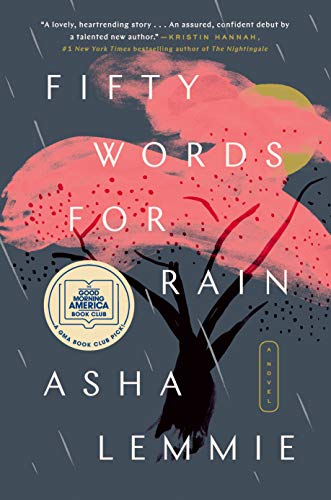“Fifty Words for Rain:” A Brilliant Story That Deserves All Its Praise

September 15, 2020
On Sept. 1, Asha Lemmie’s debut novel “Fifty Words for Rain” was released, and received plenty of praise. The book is the Good Morning America Book Club pick of the month, a Barnes and Noble Discover pick, and an Amazon Books Spotlight pick. Admittedly, after reading the synopsis, I needed this praise to even consider picking up this book. The book’s dust jacket has a synopsis that seems pretty bleak:
“Kyoto, Japan, 1948. ‘Do not question. Do not fight. Do not resist.’ Such is eight-year-old Noriko “Nori” Kamiza’s first lesson. She will not question why her mother abandoned her with only these final words. She will not fight her confinement to the attic of her grandparents’ imperial estate. And she will not resist the scalding chemical baths she receives daily to lighten her skin.”
As someone who usually prefers sappy, love stories where there is always a happy ending, I was a little hesitant to reach for a book that seemed so heavy. However, I was swayed by the description of our protagonist, who is a half-Black, half-Asian girl trying to find love and acceptance in post-World War II Japan. I saw the opportunity for a unique perspective from a type of heroine that rarely gets any representation so, I picked it up. I read it in one day. Lemmie did not disappoint.
This book is the kind of book that you do not want to put down because your mind is consumed with the characters. I do not intend on spoiling this book since it is so new, but I will try to make sense of the whirlwind of emotions that Lemmie skillfully invokes in her readers. For the most part, we are a silent observer to Nori’s tumultuous life and mind as she develops. When we are allowed to look closely at the many characters that enter, leave, and re-enter Nori’s world, we are given their first-person perspective. It was a powerful choice on Lemmie’s part, as she is able to flesh out all of the side characters in a way that connects us to them quite strongly. Greater still, by having Nori accessible to us only in the third-person, we feel just as powerless as she does when enduring her senseless hardships, both circumstantial and intentional.
I was always rooting for Nori. Even when I felt like I was going to throw the book down in utter frustration at the cruelty of both life and the people within it, I kept reading for Nori’s sake. Just like her fervent belief in the light at the end of the tunnel, I continued moving forward with her, in the hopes of seeing her step into the light. Surprisingly enough, there really is not anyone in the novel who is purely evil. Sure, we could point the finger at Nori’s prideful grandmother or at her selfish mother, but that would not be entirely accurate either. Lemmie makes her characters human, with flaws and all, so, even when you cannot fully justify their actions, you can always understand them.
I cannot recommend this book enough. I do not tend to get overly emotional about books, much less leave my tears all over the pages. Yet, I finished my book with a lump in my throat–which is coming back as I type this–and glassy eyes. Tears of sadness, anger, joy, hope, and peace. I have held Nori’s hand as she grows into a woman, sometimes too fast, and sometimes not fast enough. I highly recommend that all of you do the same. This is not a light read and it deals with triggering topics, such as assault, child abuse, war, death, and racism. “Fifty Words for Rain” is no tragedy either. It is a story about survival, hate, and the kind of love that does not end even in death. Last night, I was emotionally-spent after I laid this book back onto my nightstand, but I will gladly enter Nori’s world again and again.



MAYA • Oct 26, 2020 at 2:06 pm
I have just finished the book. It was so touching, I want to read it again.
Your review is beautiful and I believe Asha is deserving.
My book club is discussing the book this evening. Looking forward to the discussion.
Maya